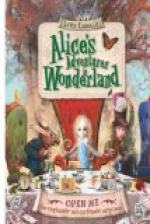|
|
Alice in Wonderland Chapter 9: The Mock Turtle's Story
The Duchess is very happy to see Alice, and they walk together arm in arm, though Alice becomes lost in thought until the Duchess tries to explain to her the moral of Alice's silence.
"'Perhaps it hasn't one,' Alice ventured to remark.
'Tut, tut, child!' said the Duchess. 'Everything's got a moral, if only you can find it.'" Chapter 9, pg. 59
The Duchess continues to find morals in everything Alice says. Her morals are often based on puns and don't actually make much sense, despite her advice to "'[t]ake care of the sense, and the sounds will take care of themselves.'" Chapter 9, pg. 60
She stops chattering only when the Queen appears and threatens to cut off her head if she doesn't leave. Alice, quite frightened, goes back to the croquet game with the Queen and the Queen goes back to threatening to cut off the heads of everyone who is playing. The Queen does take a break from her death sentences to ask Alice if she's gotten around to meeting the Mock Turtle, which is, of course the thing that Mock Turtle Soup is made from. Since Alice has no idea what a Mock Turtle is, the Queen ushers her off to meet him, and in his wife's absence the King pardons everyone.
When they come to a sleeping Gryphon, the Queen wakes him up and commands him to take Alice to hear the Mock Turtle tell his history so Alice may learn what a Mock Turtle is. When the Queen leaves to attend to her executions, the Gryphon, who up to this point makes Alice uneasy, starts to chuckle. He is wholly amused by the Queen's behavior, for he knows that she never actually has anyone put to death.
The Gryphon then leads Alice to the Mock Turtle, who is busy making pitiful sighing noises. Alice asks the Gryphon why the Mock Turtle is so sad, but the Gryphon reveals that the Mock Turtle has no sorrow--it's all in his head. In his Cockney accent, the Gryphon introduces Alice to the Mock Turtle and asks him to tell his history.
The Mock Turtle agrees to tell his story, and after a long pause he begins by explaining that once he had been a real turtle. Then he dissolves into a fit of sobbing. Alice fears that this is the whole story, but once the Mock Turtle has composed himself a bit, he goes on to say that he had gone to school in the sea and was taught by an old Turtle whom everyone called Tortoise. Alice wants to know why the teacher was called Tortoise if he wasn't one, and annoyed, the Mock Turtle tells her, "'We called him Tortoise because he taught us.'" Chapter 9, pg. 63 Both the Mock Turtle and the Gryphon are astonished at Alice's ignorance and they make her feel quite ashamed for asking such a stupid question.
The Mock Turtle claims that he received the finest of educations. Alice, who has been to day school, is not particularly impressed, but when she and the Mock Turtle compare the curricula of their schools, the Mock Turtle decides that his was superior. He had taken courses in "Reeling and Writhing" as well as arithmetic courses--"Ambition, Distraction, Uglification, and Derision." Chapter 9, pg. 65
Never having heard of such subjects, Alice asks the Mock Turtle to explain what uglification is. The Gryphon again is astounded by Alice's lack of education and tells Alice that uglification is obviously the opposite of beautification. The Mock Turtle tells Alice a bit more about his course of studies. It turns out that the Gryphon had quite a different education; he learned from an old crab who was a master in classical studies--the crab taught "Laughing and Grief."
Alice asks the Mock Turtle how long his school-day was. The Mock Turtle tells her that he went to school for ten hours on the first day, nine on the second, and so on. This seems most strange to Alice, but the Gryphon reveals to her that this is why studies are called lessons--because they lessen from day to day. Alice is very curious about this system, but the Gryphon changes the subject but suggesting they talk about school games.




